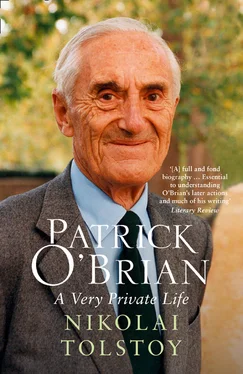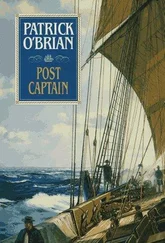Having himself, through little fault of his own, failed miserably in his own school studies, Patrick was determined that Richard should not suffer likewise. By the end of July my worried mother noted: ‘R. breaks up: what to do about him?’ As early as his return from holiday in Collioure in the previous year, Richard had urged that ‘if Dad is willing, I would like him to teach me Latin and Greek so that I could pass in them. I have got to pass.’
A swift decision was made that Richard should indeed come out to Collioure, where he could work undistracted to retake the examination. Hitherto the required subjects had comprised history, geography, and two English papers. They were not his strong fields, and he now enrolled in a correspondence course focused on mathematics and science, for which he had much greater aptitude.
On 12 August my mother and Patrick, accompanied as ever by Buddug, drove across France, camping on the way, to meet Richard at Dieppe. A week later they were back home in Collioure: ‘Got R’s hair cut & bought him respectable trousers. Dear R.’ There was no rush for the boy to begin work, since the examinations would not take place for a year. Initially, pleasant weeks were spent as before, swimming, walking, flying Richard’s new kite, and playing cards and draughts. My mother told him about her own children, to which Richard replied that ‘he saw Nik. at The Cottage [her parents’ house in Chelsea] & that he is good-looking and tall’.[fn6] Hitherto my mother had not seen any photographs of my sister and me subsequent to the time when we were small children living at her parents’ home in North Devon during the War.
A modest upsurge in their finances about this time spurred my parents to think seriously about buying a house in England or Wales. In February my mother lamented: ‘Oh for a quiet home for P: it is a shame.’ Now they received particulars of a house in Cornwall, which sounded perfect for their needs. On 30 September 1954 they departed, together with Richard and their pets, ‘after sad and tearful goodbyes’ to all their faithful Collioure friends. So confident were they of finding a new home, that they had decided never to return.
Alas, the expedition proved one of those disasters by which they were intermittently afflicted throughout their lives. From the moment of their landing in England, everything went wrong. On disembarking, they attempted to smuggle the sedated Buddug and Pussit Tasset through customs in a suitcase. Unfortunately, a passenger informed on them, and the animals were impounded in quarantine. From Dover they drove seventeen hours through the night to Boskenna, in deepest Cornwall. Once installed there, my mother found that ‘Slugs got down St Loy taps & into marmalade. No beach, only sinister, slippery great rocks with bits of wreck everywhere & one crushed fish … Hated Boskenna … Cold, foul weather.’
The little family settled into dreary lodgings, ceaselessly battered by winter gales and drenching rain. They were cold, miserable, and badly missed their pets. Although Patrick tried to cheer Richard with tales of smugglers and a proposal to buy a small boat, the reality was too grim to be lightly overcome. A brief visit to my mother’s parents in London also went badly for some reason (‘Very, very painful week’), and by December they had had enough. On the 8th all three embarked at Dover for the return journey to Collioure.
Their troubles were not over. At Dover their trunks disappeared, and they missed the Boulogne boat. They finally caught a train ferry to Dunkirk, where their animals were returned to them. Then they experienced a ‘Nightmare drive from Dunkerque to St Omer instead of Calais through dark & rain & mud & detours & sugar-beet’. Near Toulouse the radiator fell off, and the car seized up. They left it at a garage, and continued the disastrous journey by train.
Back at last in Collioure, the family appreciated what they had nearly lost. So far as their house-hunting expedition was concerned, ‘England was bad, we got too unhappy to keep up diary.’ In striking contrast, ‘Home looking perfectly beautiful & the most welcome thing I’ve known I think. Village so pleasant – everyone welcomed us.’
The Mediterranean climate helped, too: ‘For two days now it has been too warm for the Mirus [stove] even in the evenings – & in England there are tempests & snow-storms & hideous cold. We lunch daily on the beach.’
Normal routine was resumed at once, to everyone’s satisfaction. Patrick returned contentedly to his writing, and ‘R. works hard too’. At the end of the year Patrick had written to the Ministry of Labour and National Service in Penzance, requesting that Richard be permitted to postpone his national service until he had taken his GCE in June of the following year. Fortunately, this was granted.
That Christmas (1954) little presents were exchanged, but sadly the festival was marred by the underlying burden of ‘Horrid anxiety for money’. The lost luggage finally arrived, but there were hefty bills – including a couple of unexplained punctures to new tyres. As will grow more and more clear as their story unfolds, cars and my parents were not always happily matched.
Shortly after their return Patrick wrote his short story ‘The Thermometer’, which under very thin disguise depicts his unhappy childhood relationship with his father.[2] On 15 January 1955 he recorded in his diary:
I finished a story – broken thermometer – 5000 [words] nearly – very heavy going. It felt dubious – a little embarrassing; self-quaintery is always to be feared in anything at all autobiographical about childhood – approving self-quaintery – own head on one side – oh so unconscious simper – poor one. M did not like it. This makes me hate her, which is monstrously unfair. Dread of losing grip.
My mother, who I do not doubt appreciated its autobiographical character, was indeed depressed on reading the story. However, Patrick now turned to a synopsis of a book for children based on Anson’s voyage around the globe from 1740 to 1744. This my mother found ‘quite beautiful and very exciting’. Three days later it was posted to his literary agent Curtis Brown, accompanied by high hopes.
On 2 February Richard’s eighteenth birthday was celebrated in style – the last they would ever enjoy together. Presents were bestowed, after which they set off for a jaunt in the car. The weather was beautifully sunny, and they ate a delicious picnic (‘stuffed olives; Tante’s pâté; camembert; cake [baked the previous evening by my mother]; meringues; lemon-curd tart’) in an olive grove beyond Banyuls. After supper at home, they went to the cinema in the square, where they watched The City under the Sea , dismissed by my mother as ‘an idiot film’, but which probably appealed to the youthful Richard as much as it did to me about the same time.[fn7]
Life had belatedly begun to look up. A few days earlier a local peasant named Azéma had offered to sell them 300 square metres of vineyard and garden for 125,000 francs: i.e. about £110. Hitherto this would have been well beyond their means, but the final payment for The Road to Samarcand (of which more in the next chapter) and now an advance on signing the contract for The Golden Ocean could now be imminently counted upon.
My mother enquired of a neighbour whether the price was fair, and was reassured to learn that more had recently been asked for a similar parcel of land, which in contrast lacked a water supply. Everyone was very obliging. Azéma agreed that the money could be paid in instalments, beginning in April. Meanwhile they could work the property. In the event they managed to pay the whole sum in April.
After the disastrous two months wasted in Cornish house-hunting, they now found themselves landowners! On 12 February my mother wrote triumphantly: ‘We lunched on our earth.’ Patrick had longed for this moment ever since their arrival in France. He loved the sense of security and self-worth which came with ownership of even so modest a parcel of land. Despite unfortunate consequences of his initial insistence on following the advice of his seventeenth-century guide to agriculture, his four years’ gardening in Wales had afforded him considerable experience. Finally, the ability to grow their own vegetables and fruit promised a material saving on monthly outgoings.
Читать дальше












